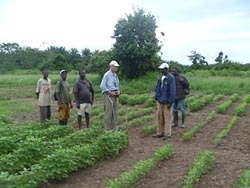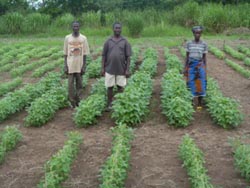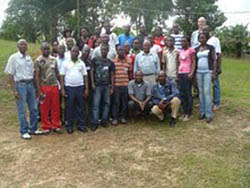"You’ll enjoy seeing the N2A legume trial in Lofa County", I was told. It’s in the northeast, close to the Sierra Leone border only 240km from Gbarnga in the center of the country where I was staying. It was the (very) rainy season and the narrow dirt road, the only route to these parts was heavily wash boarded, potholed and blocked in a number of places by large transport trucks efficiently excavating extremely deep ruts in the muddy surface as they tried in vain to force a way through. Engineer battalions from the UN force worked hard to keep the road open. Finally after 12 hours of bouncing, sliding travel we reached Foya where one of the project trials is located.
|
Challenging roads to Lofa trials sites |
John, Franklin Henries (Agronomy coordinator N2Africa Liberia) inspect trials in Lofa |
Despite its relative isolation from the capital, Monrovia, Lofa County is often referred to as the breadbasket of Liberia and a major producer of rice, the main staple in the Liberian diet. Almost 85% of Liberia’s rural households are farmers and most practice shifting cultivation on poor acid soils, cultivating for two or so seasons and then fallowing for 6 to ten years. Some minor legume production currently occurs (peanut and cowpea), but more widespread use of improved legumes and the potential introduction of soya could lead to improved soil fertility, a reduction in the length of fallows reducing land consumption by shifting cultivation, improved household incomes and nutrition.
|
N2Africa Farmers – Willidu Foya, Lofa County |
N2Africa Baseline survey training group photo |
The trial in Foya compares groundnut and cowpea local varieties with improved cultivars and soyabean under both no input and added superphosphate. Although only in its early stages, the trial shows the marked improvement of improved over local cultivars and the benefit of superphosphate. Small Liberian farmers currently make little use of purchased inputs but if the increased yields can result in improved household incomes many can benefit from the technology.
It was very much worth the painful ride...
Dr. John Fitzsimons, an Associate professor SEDRO, Dept. of Plant Agriculture Ontario and Agriculture College University of Guelph, Canada




